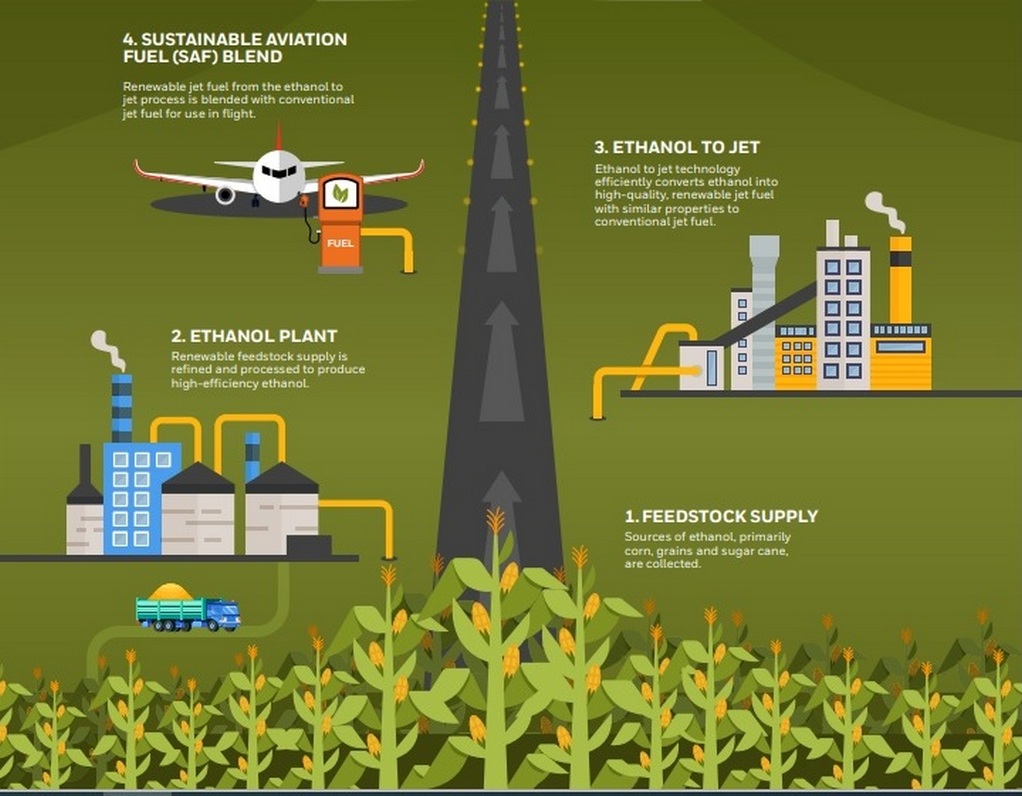Honeywell announced a new, innovative ethanol-to-jet fuel (ETJ) processing technology that allows producers to convert corn-based, cellulosic, or sugar-based ethanol into sustainable aviation fuel (SAF). Depending on the type of ethanol feedstock used, jet fuel produced from Honeywell’s ethanol-to-jet fuel process can reduce greenhouse gas (GHG) emissions by 80% on a total lifecycle basis, compared to petroleum-based jet fuel.1 Development for this technology was undertaken at the Honeywell India Technology Center in Gurugram.
Demand for SAF continues to grow, yet the aviation industry is challenged by limited supplies of traditional SAF feedstocks such as vegetable oils, animal fats and waste oils. Ethanol offers producers a widely available, economically viable feedstock. Honeywell’s ready now technology uses high-performance catalysts and heat management capabilities to maximize production efficiency, resulting in a cost-effective, lower carbon intensity aviation fuel.
A 2021 life-cycle analysis by the U.S. Department of Energy’s (DOE) Argonne National Laboratory concluded that ethanol-to-jet fuel conversion, combined with other technologies such as carbon capture and sequestration (CCUS) and smart farming practices, can result in negative GHG emissions compared to petroleum-based jet fuel.2
“Honeywell pioneered SAF production with its Ecofining™ technology, and our new ethanol-to-jet fuel process builds on that original innovation to support the global aviation sector’s efforts to reduce GHG emissions and meet SAF production targets with an abundant feedstock like ethanol,” said Barry Glickman, vice president and general manager, Honeywell Sustainable Technology Solutions. “Honeywell’s ethanol- to-jet process, when used as a standalone or when coupled with Honeywell carbon capture technology, is ready now to provide a pathway to lower carbon-intensity SAF.”
“At COP26, India committed to getting 50% of its energy requirements from renewable sources,” said Ashish Gaikwad, vice president and general manager, Honeywell UOP India. “India has already identified biofuels one of the ways to achieve energy security and could look at ETJ as an enabler to India’s 2070 emission reduction targets. Developed by engineers at Honeywell India Technology Center in Gurugram, this technology provides the country with an alternative to help reduce reliance on fossil fuels for India’s growing aviation sector.”
SAF plants using Honeywell’s technology can be modularized off site enabling faster, less labor-intensive installation compared to job site construction. By utilizing Honeywell’s ETJ technology and an integrated, modular construction approach, producers can build new SAF capacity more than a year faster than is possible with traditional construction approaches.
Petroleum refiners and transportation fuel producers can also benefit from Honeywell’s ETJ design that is purpose-built to enable conversion of current or idle facilities into SAF production plants, potentially maximizing use of exiting sites for SAF production to meet the growing market demand.
In 2021, the Biden Administration announced its Sustainable Aviation Fuel (SAF) Grand Challenge for the U.S. aviation fuel supply sector to produce at least three billion gallons of SAF per year by 2030 and reduce emissions from aviation by 20%, with an eventual goal of meeting 100% of U.S. aviation fuel demand with SAF by 2050. Also in 2021, the European Council released its ‘Fit for 55’ package which aims to increase the share of sustainable fuels at EU airports from a minimum of 2% in 2025 to at least 63% by 2050. These and other incentives, including the Inflation Reduction Act, accelerate the need for alternative SAF feedstocks to meet demand.
Honeywell is committed to achieving carbon neutrality in its operations and facilities by 2035. This commitment builds on the company’s track record of sharply reducing the greenhouse gas intensity of its operations and facilities as well as its decades-long history of innovation to help its customers meet their environmental and social goals. About 60% of Honeywell’s new product introduction research and development investment is directed toward products that improve environmental and social outcomes for customers.
Source: Honeywell
Tags: Ethanol, GHG, Honeywell, Jet Fuel, SAF



Recent Posts
Scandlines Nears Delivery of Zero Emissions Ferry Following Successful Sea Trials
India faces emission roadblocks with rising net-zero demands
Green Energy Resources invests in two electric Liebherr LHM 550
NYK Launches Continuous Use of Bio LNG Fuel on Car Carriers to Advance Decarbonization Goals
Yang Ming Expands Fleet with Methanol and LNG Dual-Fuel Vessels Under Fleet Optimization Plan
ClassNK Advocates Speed Gap Monitoring to Optimize Fuel Efficiency in Heavy Weather
Wärtsilä’s retrofit package for the Corsica Linea ferry Pascal Paoli has resulted in fuel savings of up to 22 percent Corsica Linea
COSCO Shipping Names Second Methanol Dual-Fuel Containership in Yangzhou